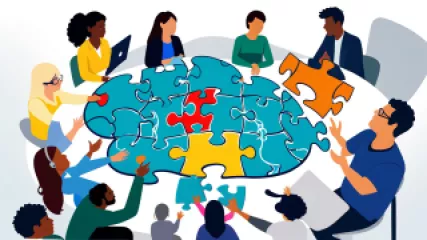Understanding Neurodiversity: A Step-by-Step Guide to Therapy Sessions Online
Neurodiversity is a concept that recognizes and celebrates the natural variation in human neurology. It challenges the traditional view that there is a "normal" or "typical" brain, and instead acknowledges that different neurological profiles are simply variations of human diversity. Neurodiversity encompasses conditions such as autism, ADHD, dyslexia, and other developmental differences.
For individuals who identify as neurodivergent, navigating the world can present unique challenges. They may experience difficulties in social interactions, communication, sensory processing, and executive functioning. These challenges can impact their mental health and overall well-being. That's where neurodiversity therapy comes in.
The Benefits of Neurodiversity Therapy
Neurodiversity therapy focuses on providing support and guidance tailored to the specific needs and strengths of neurodivergent individuals. It aims to help them understand and embrace their neurodivergent identity, develop effective coping strategies, and navigate the neurotypical-dominated world.
Here are some key benefits of neurodiversity therapy:
- Self-Acceptance: Neurodiversity therapy promotes self-acceptance by helping individuals recognize their unique strengths and abilities. It encourages them to embrace their differences and build a positive self-image.
- Coping Skills: Neurodiversity therapy equips individuals with essential coping skills to navigate various challenges associated with their neurodivergent traits. It helps them develop strategies to manage sensory sensitivities, improve social interactions, and regulate emotions.
- Empowerment: Through therapy, neurodivergent individuals gain a deeper understanding of their neurological profile and how it influences their experiences. This knowledge empowers them to advocate for their needs and rights.
- Relationship Building: Neurodiversity therapy provides a safe space for individuals to explore and improve their social skills. It helps them develop meaningful connections, understand social cues, and enhance their communication abilities.
- Reduced Anxiety: Many neurodivergent individuals experience heightened anxiety due to the challenges they face in a predominantly neurotypical world. Neurodiversity therapy addresses anxiety by teaching relaxation techniques, stress management strategies, and fostering a supportive therapeutic relationship.
Understanding Neurodiversity Therapy Sessions Online
With the advancements in technology, neurodiversity therapy sessions can now be accessed online. This mode of therapy offers convenience, accessibility, and flexibility for neurodivergent individuals who may face barriers to in-person sessions.
Here is a step-by-step guide to understanding and accessing neurodiversity therapy sessions online:
Step 1: Finding a Qualified Therapist
The first step is to find a qualified therapist who specializes in neurodiversity and understands the unique needs of neurodivergent individuals. Look for therapists who have experience working with your specific neurodivergent condition, such as autism or ADHD.
There are various online directories and platforms that can help you find therapists who offer neurodiversity therapy sessions online. Consider factors such as their qualifications, experience, and approach to therapy.
Step 2: Initial Consultation
Once you've found a potential therapist, schedule an initial consultation. This can typically be done over video call or phone. The purpose of the consultation is for you and the therapist to get to know each other, discuss your goals, and determine if it's a good fit.
During the consultation, be open and honest about your neurodivergent traits, challenges, and what you hope to achieve through therapy. This will help the therapist assess your needs and tailor their approach accordingly.
Step 3: Setting Up the Online Therapy Space
Prior to your first online therapy session, ensure that you have a quiet and private space where you can engage in therapy without distractions. Set up your device (computer, tablet, or smartphone) in a stable position, ensuring good lighting and a reliable internet connection.
It's also important to test the video call platform beforehand to ensure that it's compatible with your device and that you feel comfortable using it. Familiarize yourself with the platform's features, such as muting and screen sharing.
Step 4: Attending Therapy Sessions
When it's time for your therapy session, log in to the video call platform and join the session at the scheduled time. Treat the online therapy session just like an in-person session by being present and engaged.
During the session, you and your therapist will work collaboratively to address your goals and concerns. The therapist may incorporate various therapeutic techniques, such as cognitive-behavioral therapy (CBT), social skills training, or mindfulness exercises, depending on your specific needs.
Be open to sharing your experiences and emotions honestly, as this will enable the therapist to provide you with the most effective support. Remember that therapy is a safe space, and confidentiality is maintained.
Step 5: Between Sessions
Between therapy sessions, it's essential to practice the strategies and techniques discussed during the sessions. Your therapist may assign homework or suggest activities to help reinforce what you've learned.
Engage in self-reflection and practice self-care to support your mental well-being. Consider journaling, engaging in hobbies, or seeking additional resources related to neurodiversity.
Step 6: Progress and Review
Neurodiversity therapy is an ongoing process, and progress may take time. Regularly evaluate your progress with your therapist and discuss any adjustments or modifications needed in your treatment plan.
Remember that therapy is a collaborative effort, and your active participation is crucial for achieving positive outcomes.
Conclusion
Neurodiversity therapy sessions online provide valuable support and guidance for neurodivergent individuals. By embracing the concept of neurodiversity and accessing appropriate therapy, individuals can develop self-acceptance, coping skills, and empowerment.
Remember to find a qualified therapist, set up the online therapy space, attend sessions with an open mind, practice between sessions, and regularly review your progress. With these steps, you can embark on a therapeutic journey that celebrates and supports your unique neurodivergent identity.






